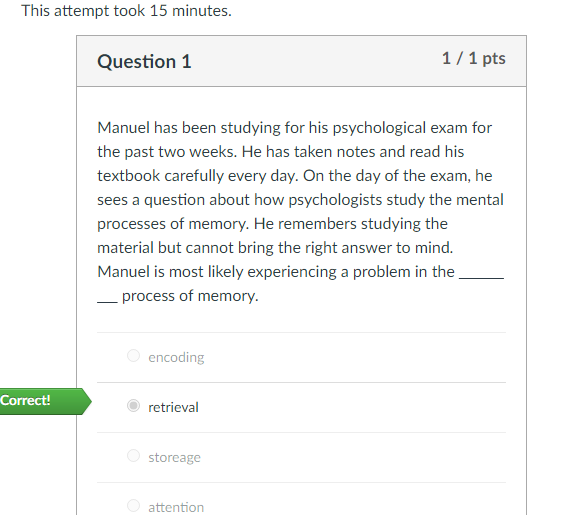Chapter 7 Homework: Memory
Question 1
Manuel has been studying for his psychological exam for the past two weeks. He has taken notes and read his textbook carefully every day. On the day of the exam, he sees a question about how psychologists study the mental processes of memory. He remembers studying the material but cannot bring the right answer to mind. Manuel is most likely experiencing a problem in the process of memory.
encoding
retrieval
storeage
attention
Question 2
Keith and Natasha are both taking notes in the same lecture course. Natasha takes notes by hand. Keith takes notes on his laptop, which allows him to check his email and get started on the homework during class. Which is most likely true about Keith and Natasha?
Natasha will have better long-term memory of the lecture material but Natasha and Keith will not differ significantly in their performance in the course
Natasha will remember more of the lecture material and perform better in the course than Keith will
Keith will perform better than Natasha in the course, if he is a better multitasker
Natasha and Keith will not differ significantly in their memory of the lecture material
Question 3
Connie sits down to watch her favorite TV show but she is preoccupied with thinking about her upcoming exam. Her mind wanders and she texts her friend about the exam during the show. The next day, she finds that although she sat through the whole show, she cannot remember what happened. Why might Connie have forgotten this information?
Connie’s long-term storage capacity was limited, so only the most relevant information was retained
Connie failed to maintain the information in working memory overnight, so it was not encoded in long-term storage
Connie waited too long to retrieve the information from short-term storage, so it was lost
Connie experienced sensory input but she did not attend to it, so the information was not successfully encoded
Question 4
Dr. Elmor conducts research in which she asks participants to look at a slides that contain an array of objects and then tests their memory of the objects on the slides. The participants are given no more than 2 seconds to look at each slide. Which of the following types of memory is Dr. Elmore studying?
short-term memory
semantic memory
sensory memory
episodic memory
Question 5
At the café, a cup of coffee costs $2.82. To use exact change, you must hold the number 2.82 in your head while sorting through your wallet and calculating what coins you have. To be successful in actively processing this information, you must keep information maintained in short-term storage by using your memory.
procedural
episodic
semantic
working
Question 6
Morgan is taking a course on public speaking. To learn outlining skills, she gives a speech about an informative topic assigned by the instructor. Then, to learn persuasive speaking skills, she gives a speech about a cause that is very important to her. Next year, Morgan is most likely to remember the skills from:
her first speech, because no personally meaningful information will interfere with her memory of the skills she learned
her second speech, because she related the information to something meaningful to her
her first speech, because the primacy effect will enhance her recollection of the first information she learned in the course
her second speech, because the recency effect will keep the information in short-term storage
Question 7
Harry is reading the textbook for his astronomy class and is trying to relate the material to his own life experiences. According to levels of processing model, this makes Harry more likely to remember the information over the long term because he is using:
elaborative rehearsal
reconsolidation
spreading activation
maintenance rehearsal
Question 8
Jorge knows that Monika goes to a lot of parties. When Bella asks Jorge what Monika is like, he says Monika is an extravert. Even though Jorge only knows that Monika goes to a lot of parties, he tells Bella that Monika is an extrovert because he:
has a memory bias against people who like to go to parties
retrieved his memory about Monika in a context that involved interacting with others
has a schema about going to parties that includes being extroverted
did not encode the original information about Monika properly
Question 9
If the Wicked Witch of the West flew down and gave you retrograde amnesia, you would be to remember anything from before the incident and to form new memories.
able; able
unable; able
unable; unable
able; unable
Chapter 7 Homework: Memory-Question 10
Yolanda has a brain tumor. As the tumor grows, Yolanda loses the ability to form new memories in long-term storage. Yolanda most likely has amnesia.
retrograde
proactive
anterograde
retroactive
Question 11
Sue and Mary are talking about knitting. Sue is trying to remember the first time she ever knit something. Mary is trying to remember what the word knitting means. Sue is trying to recall a(n) memory and Mary is trying to recall a(n) memory
procedural; episodic
procedural; semantic
episodic; procedural
episodic; semantic
Question 12
Igor has not been skiing in 10 years. However, when he gets on his skis, his body remembers exactly how to ski. The kind of memory that makes this possible for him to remember how to ski is:
procedural
explicit
episodic
semantic
Question 13
Joseph has amnesia and cannot remember anything about his past, but he still remembers how to play the piano and tie his shoes. Joseph most likely has amnesia, while his memory remains intact.
anterograde; explicit
retrograde; implicit
anterograde; implicit
retrograde; explicit
Question 14
A local police officer wants to collect statements from witnesses to a traffic accident. What can the officer do to avoid influencing the memories of these witnesses?summarize the facts of the accident for the witnesses before questioning them
ask the witnesses to rate the accuracy of their accounts
wait to question the witnesses until they have formed stable memories of the event
interview the witnesses immediately, before their memories can be contaminated
Question 15
Name the 3 stages of information processing in the acquisition of memory. Imagine that you are reading a story in a magazine. Describe how that information would go through these 3 stages of information processing in the acquisition of a memory. Be specific! (Minimum of 100 words; include word counts. Use complete sentences)
3 pts for naming the stages; 3 points for specifically explaining how the information would go through the 3 stages
Answer Preview-Chapter 7 Homework: Memory-PSYC-101

